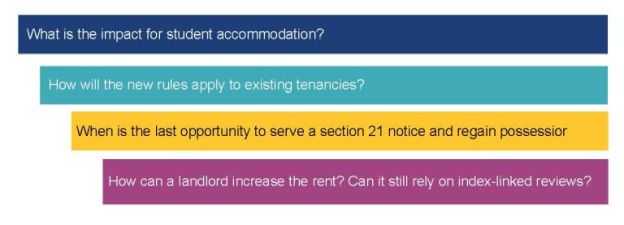The long-awaited Renters (Reform) Bill was introduced to the House of Commons on 17 May 2023. It followed in the wake of the White Paper titled "A Fairer Private Rented Sector" which was published in June 2022, so there were no great surprises hidden within it.
The headline points
These are now abundantly clear from the flurry of activity and reports in the press and include:
- Abolition of the so-called "no-fault" terminations under section 21 of the Housing Act 1988 (the "Act")
- Removal of fixed term tenancies
- Prohibition on unreasonably refusing consent for tenants to have pets
- New landlord redress scheme
- Ban on rent review clauses and rent increases limited to section 13 of the Act
- Enhanced (and new) grounds for possession including:
- the landlord requires the property for their own/family's occupation
- the landlord is selling
- repeated rent arrears
- anti-social behaviour
Problems for intermediate landlords
However, the ramifications of the proposed reforms go much deeper. Let's look at one example. The Bill as drafted causes problems for intermediate landlords. Section 21 is commonly used to obtain possession of residential premises when an intermediate lease ends and the intermediate tenant (also the landlord of the occupational tenant) needs to provide vacant possession to a superior landlord. So, a landlord ("A") lets a mixed-use property to B, who occupies the commercial parts and sublets the residential part to C. This is a very common scenario in the private rented sector. If B's headlease is terminating and they are contractually obliged to give vacant possession of the property to A, the Bill does not provide for a ground of possession of C's property. There are grounds of possession when a headlease is ending, but it is limited to private registered providers of social housing or supported accommodation. This could lead to intermediary landlords being placed in breach of their leases. Unless this is addressed in the Bill, any party dealing with such interests will need to think carefully about the impact of yield-up provisions where the premises are underlet to residential tenants.
Further questions raised
Whilst the Bill is at an early stage, and may change during its passage through Parliament, it raises many other questions:

These issues, and many more, are considered in our new briefing note exclusively for clients. Click here to request a copy.
The content of this article is intended to provide a general guide to the subject matter. Specialist advice should be sought about your specific circumstances.



